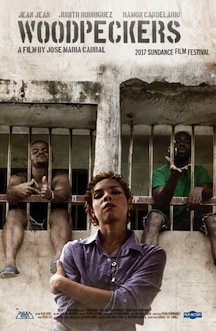Directed by Jose Maria Cabral
Country: Dominican Republic
Prison film is a subgenre that most likely overlaps with the drama and action genres, requiring a great dose of originality and exciting moments to subsist, taking into account the recurrent exploration of the topic.
Classic titles like “Le Trou”, “A Man Escaped”, “Papillon” and “The Shawshank Redemption” are among the most coveted ones, but a few recent releases gained considerable recognition by depicting lives of prisoners with interesting cogitation. Within that group, we have David Mackenzie’s “Starred Up” and Jacques Audiard’s “A Prophet”.
Like the ones cited above, “Woodpeckers” is unquestionably a prison film, even if it doesn't take the same paths as those. The Dominican entry for the Best Foreign Language Film at the 90th Academy Awards isn't focused on any escape attempt despite encompassing a prison riot that, in fact, feels frivolous and nearly amateurish.
The inconsistency noticed during a few important scenes, working hand in hand with fabricated routines, thwarts a curious fact-based story that would have flourished if convincingly tackled.
Julian (Jean Jean) is convicted of a robbery and sent to Najayo Prison, where his long hair is shaved and he’s abandoned to his own luck. Once in the hole, he makes some useful friends who help him sleep decently and comfortably for a little sum of money, but inevitably bumps into unscrupulous, selfish thugs like Manaury (Ramon Emilio Candelario). The latter teaches him the sign language known as ‘pecker talking’, which serves to communicate at a long distance with the prisoner women who frequently show up in the adjacent yard to flirt with the male inmates.
Hence, Julian is 'hired' to make the bridge between Manaury and his girlfriend Yanelly (Judith Rodriguez), who shows an irreversible discontentment for being ‘cheated’ when trapped in the solitary for improper behavior. Instead of coping with the task given to him, Julian charms Yanelly and soon conquers her heart, a dangerous move that puts his safety at stake. It then becomes clear that our hero, who is no chicken-hearted nor a rioter, will have to fight for love.
The expressive images showing the ignominious conditions of an overpopulated prison - the place is a real Dominican Republic correction facility - is one of the best aspects of a too softened drama that falls short of its ambitions.
Although timidly showing faculties here and there to do better in the future, writer-director Jose Maria Cabral, often resorts to obvious moves while his characters lack that charisma and sometimes vibration to make this incarcerated love story work beyond a faintly enjoyable, melodramatic trifle.



